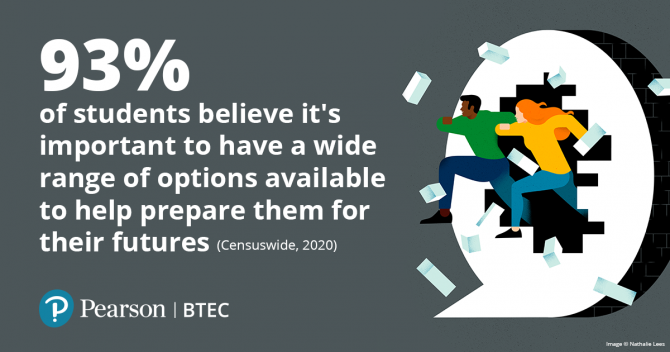The careers and skills landscapes were changing before 2020 – and, as with so many things, the pandemic has accelerated this. The make-up of the workforce will continue to evolve in the coming months and years with greater automation, a shift to digital enabled roles and growth, contraction and transformation happening across many business sectors.
This all has a knock-on impact on the demand for skills and education, and the sector needs to flex and adapt so we can support both young people and adults to make progress in their lives. We recently conducted some polling (with 3000 young people and their parents, as well as those already in employment) to hear first-hand what they want this support to look like.
Keeping options open
It is clear that they want to be able to keep their educational options open, in a bid to prepare themselves for their future careers. Over 9 in 10 (93%) of young learners, and 84% of adults felt it was important to have a range of learning choices available to them in order to succeed in their careers. In a similar trend, just over 95% of parents agreed with this, and a further 4 in 5 (81%) stated that their child’s course should provide them with practical skills as well as theory-based learning.
Need for broad courses and a focus on transferable skills
The results also show the continuing need for broader courses that can take learners on a variety of career pathways. The importance placed on preparation for the future and the changing job landscape is further cemented in the fact that only 27% of 16-18-year-olds surveyed and their parents (20%) agreed that young people should have to choose a specific occupation to study for, as opposed to also being able to choose a route that prepares them for a range of careers.
Flexible and accessible bite-sized learning for adults
There is also the desire for flexible and accessible bite-size learning for busy adults looking to upskill to meet changing demand. 83% of 25-44-year-olds want a choice of courses available to them, including bite size learning and short courses so they can continue to upskill while they work.
When asked to think about their future employment, over 4 in 5 (86%) young learners agreed that they will have to continue learning new skills throughout their life to be prepared for the world of work. Likewise, over two thirds (66.3%) of adults believed that they will have to keep learning throughout their lives to have the relevant skills and knowledge that are valuable to employers.
The role of education and learning remains crucial as the nation continues to respond to changes both at an individual, community and wider economic level. Further education and career focused education has always responded with a talent and skills strategy to support the evolving needs of employers, and we’ll need to be as nimble as ever to adapt to the huge transformations in technology, industries, careers, learning and lifestyles.
Find out more about Pearson’s Your Future Your Choice campaign: go.pearson.com/yourBTEC









Your thoughts